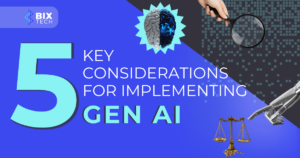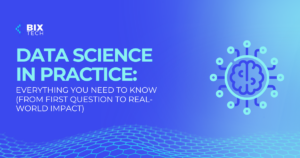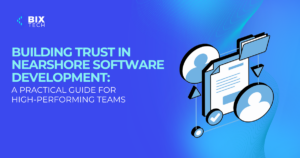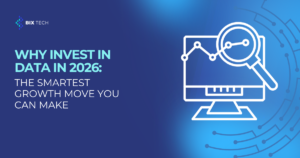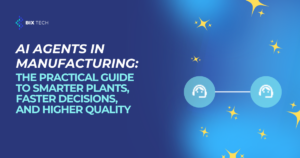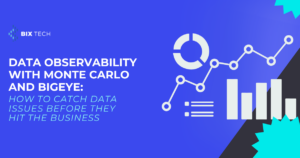Data Science Demystified: Unlocking Business Growth with Intelligent Insights

Sales Development Representative and excited about connecting people
In today's hyper-connected world, data is no longer a byproduct of business—it's a core asset. But raw data alone is of little value. The real magic happens when data is transformed into actionable knowledge that guides decision-making, streamlines operations, and sparks innovation. Enter data science: the field that bridges the gap between information overload and breakthrough business results.
In this comprehensive guide, we'll demystify data science, explore its real-world applications, and share practical insights for harnessing its power to drive your business forward.
What Is Data Science?
At its core, data science is the discipline of extracting meaning and insights from data using scientific methods, algorithms, and technology. It weaves together elements from statistics, computer science, domain expertise, and data visualization to answer complex questions and predict future trends.
In practice, data science involves:
- Collecting data from various sources (databases, web, sensors, etc.)
- Cleaning and preparing this data for analysis
- Exploring and visualizing the data to uncover patterns
- Applying statistical models and machine learning to find insights or make predictions
- Communicating findings in a clear, actionable way for business stakeholders
Data science isn't just for tech giants—it’s transforming organizations of all sizes and industries, from retail and manufacturing to healthcare and finance.
Why Is Data Science Important for Businesses?
The competitive edge in business today often comes down to who can leverage their data most effectively. Here are some key reasons why data science matters for organizations:
1. Informed Decision-Making
Data science enables evidence-based decisions rather than relying on gut instinct. For example, retailers use data science to optimize inventory, predict customer demand, and personalize marketing campaigns.
2. Operational Efficiency
By analyzing process data, companies can identify bottlenecks, reduce costs, and improve productivity. Manufacturers, for instance, use predictive analytics to anticipate equipment failures and schedule proactive maintenance.
3. Customer Insights and Personalization
Understanding customer behavior is a game-changer. Data science helps businesses segment customers, anticipate needs, and deliver tailored experiences—boosting loyalty and sales. AI-enhanced customer experiences are rapidly becoming the norm.
4. Risk Management and Fraud Detection
Banks and insurers use data science models to detect fraudulent transactions, assess credit risk, and ensure compliance with regulations.
5. New Product Development
By analyzing market trends and customer feedback, companies can spot unmet needs and develop innovative products faster.
How Does Data Science Work? The Typical Workflow
While every data science project is unique, most follow a similar workflow:
- Define the Problem: What business question are you trying to answer?
- Collect Data: Gather relevant data from internal and external sources.
- Prepare Data: Clean, format, and organize the data for analysis.
- Explore Data: Use statistics and visualization tools to uncover patterns.
- Model Data: Apply machine learning or statistical models to extract insights or predictions.
- Validate Results: Test models for accuracy and reliability.
- Communicate Findings: Visualize results and translate insights into business actions.
For a deeper dive into how data science is revolutionizing business, check out Data Science: The Business Revolution.
Real-World Examples of Data Science in Action
Let’s make this concrete with a few examples:
Retail: Dynamic Pricing
E-commerce platforms use data science to analyze browsing behavior, competitor prices, and inventory levels, allowing them to adjust prices in real time to maximize profit and sales.
Healthcare: Predictive Diagnostics
Hospitals leverage patient records and machine learning algorithms to predict disease outbreaks, identify high-risk patients, and recommend personalized treatments.
Manufacturing: Quality Control
By analyzing sensor data from production lines, manufacturers can detect defects early, reduce waste, and maintain product quality.
Finance: Algorithmic Trading
Financial institutions use complex data models to predict market trends and execute trades at optimal times, often in fractions of a second.
Key Tools and Technologies in Data Science
Data scientists rely on a rich toolkit to wrangle and analyze data. Some of the most popular tools include:
- Programming Languages: Python, R, SQL
- Data Visualization: Tableau, Power BI, Matplotlib
- Machine Learning Libraries: scikit-learn, TensorFlow, PyTorch
- Big Data Platforms: Hadoop, Spark, Databricks
- Cloud Services: AWS, Azure, Google Cloud
Curious why Python is so popular for AI and data science? Discover Why Python is the Ideal Language for AI.
Overcoming Challenges in Data Science Implementation
While the benefits are clear, implementing data science in your organization comes with challenges:
- Data Quality: Inaccurate or incomplete data can lead to poor insights.
- Talent Shortage: Skilled data scientists are in high demand.
- Change Management: Integrating data-driven approaches requires cultural shifts.
- Security and Privacy: Handling sensitive data demands robust governance.
The key is to start small, focus on high-impact pilot projects, and build data literacy across your team.
Getting Started: How Your Business Can Leverage Data Science
Ready to unlock the power of data science? Here are some practical steps:
- Identify a business problem that can be addressed with data (e.g., reducing churn, improving forecasting).
- Audit your existing data assets—what do you already collect, and what gaps need filling?
- Build the right team, either by hiring talent or partnering with data science consultants.
- Invest in modern data infrastructure to store, process, and secure your data.
- Foster a data-driven culture—encourage curiosity, experimentation, and cross-functional collaboration.
If you want to understand how to transition your company into a data-driven powerhouse, don’t miss What Does Your Business Need to Become a Data-Driven Organization?.
The Future of Data Science in Business
Looking ahead, data science will become even more critical as businesses face growing data volumes and complexity. Innovations in artificial intelligence, automation, and cloud computing will continue to expand what’s possible.
Those who embrace data science early will be positioned to outpace competitors, delight customers, and lead in their industries.
Final Thoughts
Data science is no longer a luxury—it's a necessity for businesses seeking sustainable growth in today's digital world. By demystifying data science and taking practical steps to integrate it, you can transform your raw data into a strategic engine for innovation and success.
Ready to take your first step? Start by asking, “What could we do if we truly understood our data?” The answers might just change the future of your business.
Explore more on data, AI, and digital transformation on our blog and stay ahead of the curve!



